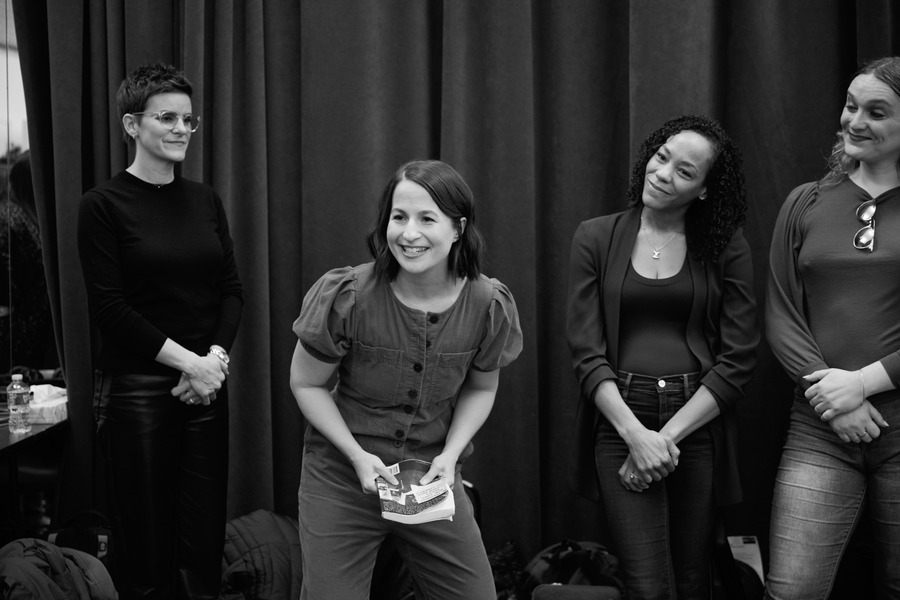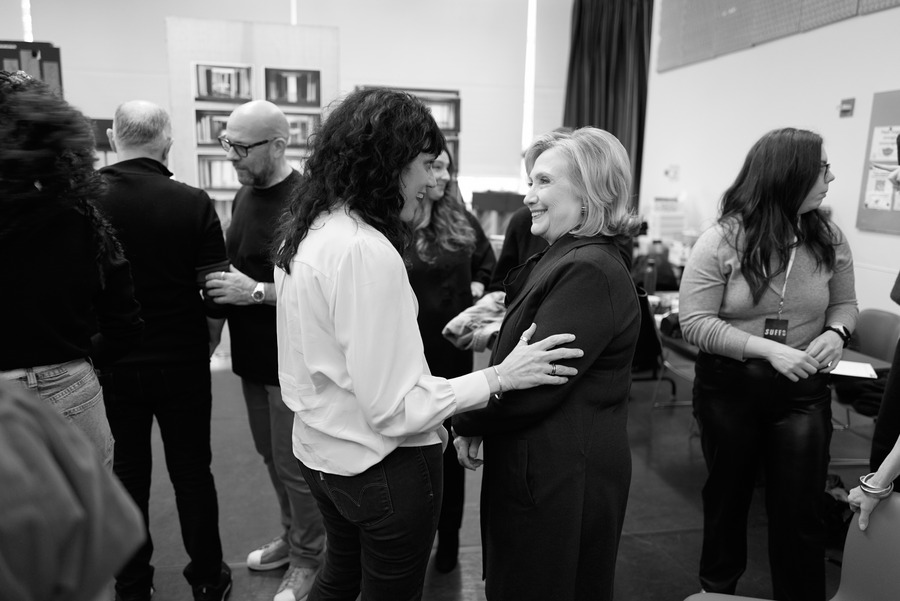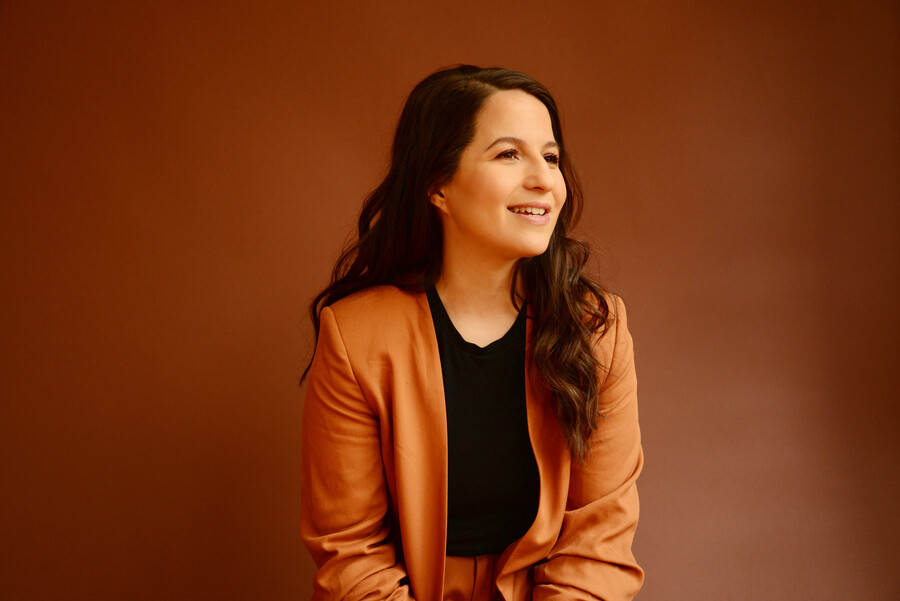The YouTube comments for “Keep Marching,” the rousing new finale for Shaina Taub’s musical Suffs, arriving on Broadway next week after a decade of development, reflect how much is at stake. “This musical is going to change the world,” gushes one fan, while another replies, “From your keyboard to God’s inbox! I do hope this show empowers women to vote. There is so much on the line this year.”
While many modern Broadway musicals traffic in pop feminism (Six, & Juliet, the short-lived Once Upon a One More Time), Suffs spotlights bona fide historical feminists, specifically the early 20th-century leaders of the American women’s suffrage movement. Starring an all-women and nonbinary cast, it’s a dramatic tale of generational and cultural clashes as the Suffs, as they’re nicknamed, fight for the passage of the 19th Amendment, which granted women (well, white women) the right to vote in 1920.
Politics are at the heart of both the show’s artistry and its advertising: Suffs’s producers include Hillary Clinton, who appears in the musical’s playful teaser and is co-hosting a Broadway fundraiser for Joe Biden at a special April 3 performance. The women behind the show—particularly Taub, who wrote the book, music, and lyrics, and also stars as suffragist Alice Paul—don’t just want audiences to stand up at the end. They want them to leave fired up.
“As I started to really get to know Shaina and her work, I wondered if she would be the right person to write Suffs,” recalled producer Rachel Sussman, who has dreamt of a musical about women’s suffrage since she was 12. (“I had some really interesting hobbies as a young person,” she added with a laugh.) After being introduced by a mutual friend and catching Taub in concert at Joe’s Pub, where the singer-songwriter frequently performs jazz- and pop-tinged tunes that fuse personal and political concerns, Sussman decided to gauge her interest. Over dinner in 2014, Sussman handed Taub a copy of Doris Stephens’s book Jailed for Freedom, a firsthand account of the movement. Taub read it in one night and immediately signed on, shocked by how little she knew about this vital history.
That history was also new to Leigh Silverman, who directed Suffs’ world premiere at the Public Theater two years ago and is now helping to bring it to Broadway. “This is a story that I would have been so hungry to learn about when I was young, with these incredible, inspiring women,” she says. “I think we are in a moment where stories about activism and activists feel particularly necessary.”
This election year wasn’t meant to be Suffs’s moment. Originally slated for 2020 to coincide with the 19th Amendment’s centennial, the production was postponed due to the pandemic shutdown. While its buzzy 2022 downtown run sold out, many critics weren’t sold, with the show receiving mixed reviews (full disclosure: I loved it). A Broadway transfer was delayed as Taub dove into rewrites. In addition to fresh songs and scenes, the revamped Suffs, which begins previews at the Music Box Theatre on March 26, features an entirely new design team, a new choreographer (Mayte Natalio), and some new faces, though many cast members from the Off-Broadway run remain, including Nikki M. James as Ida B. Wells, Jenn Colella as Carrie Chapman Catt, and Grace McLean as President Woodrow Wilson.
In a recent interview, Taub wouldn’t say whether she had read Suffs’s so-so notices, but someone on her team must have. A frequent complaint—that the show supposedly lacked humor—was dispelled at a recent press event at the Great Hall, where a new song, “Great American Bitch,” showed off the suffragists’ satirical side.
Best known for her crowd-pleasing musical adaptations of As You Like It and Twelfth Night at Shakespeare in the Park, and a collaboration with Elton John on The Devil Wears Prada musical, which opens in London later this year, Taub is taking a major career leap with Suffs, which marks her Broadway debut as composer, playwright, and performer. On a recent Zoom call from the midst of rehearsing and revising, Taub talked about her hopes, both personal and political, for the show.
Following are excerpts from our conversation.
RAVEN SNOOK: When did the talk of taking Suffs to Broadway start?
SHAINA TAUB: Broadway was always a part of our goal. I think we all felt like we had to keep going. You asking that makes me realize it was never like, will we or won’t we? We all knew in our bones that we weren’t finished. My character’s first song is called “Finish the Fight,” and in my mind it always felt like: Finish the show. I’ve just been trying to finish the show all these years.
How has Suffs evolved over the past two years? I know you have a new finale. What happens? Feminism wins and Roe v. Wade is reinstated?
If only, through the power of my revisions, I could reinstate a Supreme Court decision! The revisions have been about, how can I further that idea more effectively in a different song? Or how can I distill this beat so it’s actually just a short book scene, and then the bigger moment is here? The bones are the same. We have a new finale and a new opening number—I don’t want to give it away. Theatre folks know the stories about “Comedy Tonight” in A Funny Thing Happened on the Way to the Forum and “Tradition” in Fiddler, how the opening number sometimes comes last. We had the same opening number in readings for years. Downtown, I realized people were coming into the show not knowing anything about suffrage. To immediately hit them with an anti-suffrage perspective was not the warmest opening into the show.

Before Suffs’s world premiere at the Public, you had a “dramaturgical brain trust” dubbed the Coven that included then-choreographer Raja Feather Kelly and Shakespeare scholar Ayanna Thompson. Have you continued to solicit creative input from others while readying Suffs for Broadway?
I have such a student mentality of wanting to get a good grade, and wanting to get everyone’s second opinion. I’ve done that for so many years. Look, I’m so lucky to be surrounded by brilliant people on this project, whose feedback has blown my mind constantly. Yet part of these past two years has been a process of empowering myself to trust my own impulses about what the show needs. I think taking it out of the mind and into the body really helped me. I really, finally, truly listened to myself, and I think the art is better for it.
You’ve done the crowdsourcing. Now it’s time to self-source.
Yes. And I’m so lucky to have amazing mentors. That’s something I love about the community of theatre songwriters: They take care of their young. All these names I grew up looking at on cast albums in Vermont, like Lynn Ahrens, Jeanine Tesori, these heroes to me, they’ve been so generous. I seek their insight, not just dramatically and musically, but also, how do I manage all these balls in the air? I feel very held by the community in a way that I’m so grateful for.
You also have some pretty amazing producers. How did you get Hillary Clinton and education activist Malala Yousafzai to back Suffs?
Secretary Clinton came to see the show at the Public and we did a talkback event with her, which was surreal. She was so warm and wonderful, and obviously brilliant. So last summer, as we were preparing for the Broadway run, I wrote her a letter. I just wrote from the heart about how I remembered seeing her speech about “women’s rights are human rights” on TV with my mom, and how her presidential campaign felt so tied up in the evolution of the show. In 2016, I was phone-banking for Secretary Clinton while writing “The Young Are at the Gates.” When she said in her [concession] speech, “to all the little girls who are watching this, never doubt that you are valuable and powerful and deserving of every chance and opportunity in the world to pursue and achieve your own dreams,” it gave me strength to keep going.
At the time, I had this research fellowship at the Radcliffe Institute and the Schlesinger Library, where Alice Paul’s papers are. I had come back to New York just for election night because I was in this political sketch comedy group, and we were doing an election night sketch show. My plan was to get on a train the next morning and go right back to Cambridge and keep writing. But you remember New York that day, it was so bleak. I remember, I was sitting on my iPhone and watching her speech and I was like: Get on the train, go, work. I tried to ineloquently tell this all to her in a letter, not even expecting a response. I was so shocked and moved and delighted when she got back to us and immediately wanted to be involved.
Malala Yousafzai, similarly, had seen the show at the Public, and she had done an interview with me for her newsletter. So I also wrote Malala a letter about what her activism and her advocacy for girls’ education around the world has meant to me, and she also came on board. Their missions, fighting for girls’ and women’s empowerment, are so in line with what we’re trying to do.
One of the many things I admire about both of them is that they understand the power of theatre and storytelling to further those advocacy efforts. I’m thrilled that Suffs is going to Broadway because that’s how shows get to be a part of the national consciousness and get done in high schools. And I want Suffs to be done in high schools. I want kids to grow up embodying these characters and for this history to come through theatre. That’s the way I learned about so many things, through doing Cabaret and The Sound of Music, all these shows.

As a history-based musical starring its creator that started at the Public and features color-conscious casting, Suffs is often compared to Hamilton. How do you feel about that?
Look, I love Hamilton. To be compared to or even mentioned in the same conversation is exciting. I see the sort of superficial similarities, and, like I said, I am honored. But I also challenge the comparison, because there are so many fundamental differences. The brilliance of Hamilton is, here are these Founding Fathers that we’ve all read about in school, and we see and hear them in a way we never have before. With Suffs, we may be the first time a huge percentage of our audience has ever heard the names Ida B. Wells, Carrie Chapman Catt, Alice Paul, the list goes on. Something I envy is the ability to have a shorthand with an audience about a history. I feel like with a lot of people, I’m starting at zero. That’s been the challenge with Suffs: How do I not overload everyone with exposition and historical detail? How do I give just enough context so the audience can be gripped emotionally and then go home and Google all night, not at the show?
I actually want to point out that it’s not Alice Paul’s first appearance, at least in some form, on Broadway. Did you see Selina Fillinger’s play POTUS?
I loved POTUS! It’s funny, before I saw it everyone was texting me! I think one of our co-producers somehow has the model that the Alice Paul bust in POTUS was made on. I love the POTUS connection.
It’s a banner spring for musicals written by women: Hell’s Kitchen, The Notebook, The Great Gatsby, Lempicka, Suffs. How do you think Broadway is doing in terms of gender parity?
I think we still have a long way to go. But it is thrilling, truly, to be a part of a season where I’m not the only female composer. I was just with Ingrid Michaelson [who wrote the score for The Notebook] the other night, and we were marveling that, for a couple of weeks in April before the amazing Kimberly Akimbo closes, right there on 45th Street, there will be shows by three women composers: Ingrid, myself and Jeanine. Then, right around the corner, there’s Hell’s Kitchen by Alicia Keys.
With Suffs, I want to model for younger women coming up that you can be a multihyphenate on Broadway. You can be a creator-performer; that’s not just an avenue reserved for men. Like Jeanine talked about in her Tony speech for Fun Home, “You have to see it to be it”—that really resonated with me. How can I do whatever I can in my power to try and kick a door down so I can make it easier for the people behind me? Because I am only in this position because of Liz Swados, Lynn Ahrens, Jeanine Tesori, Kirsten Childs, and Micki Grant, who was the first woman to write the book, music, and lyrics, and star [in a Broadway musical: Don’t Bother Me, I Can’t Cope]. I know that I am the beneficiary of the previous generations. What can I do for the next generation?
Raven Snook (she/her) is the editor of TDF Stages, a contributing theatre critic to Time Out New York, and a reformed performer.


